In the stillness of the night, small creatures travel unseen through a rectangle of dust on the floor of the Provincetown Art Association and Museum. These “gallery ghosts” leave faint traces of their presence visible to the viewer the next day.
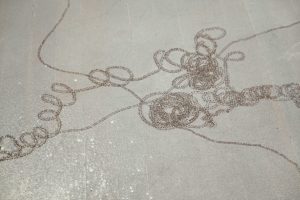
“The piece is changing throughout its time on show,” says Fine Arts Work Center fellow Georden West of their installation, he is quit, on view at PAAM through March 6. “People have asked me why I haven’t set up a night-vision camera to take photos of what is moving through the darkness, but I’m not interested in naming these hidden, fringe creatures. The intention is for the ecology of the space to speak through impression alone, which leads to a much deeper experience.
“It’s been such a tremendous couple of years of loss, of huge social shifts and social collapse even,” continues West. “In a way we are all passing by each other unseen right now.”
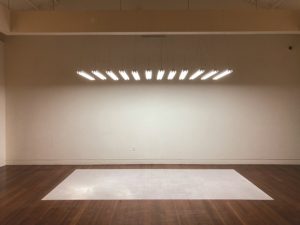
West, who won a Student Academy Award in the alternative/experimental category for their short film Patron Saint in 2019, defines themself as a “time-based artist placing queerness and duration in dialogue.” Patron Saint, which West co-wrote and directed while apprenticing with Nick Knight at SHOWstudio in London, re-imagines the history of Joan of Arc. Working with a fashion line by designer Jamall Osterholm, West creates a magical, mesmerizing celebration of the queer, Black divine.
“Fashion is inherently so queer,” says West. “We’re constantly trying on identities and taking them off, so there is something about working with fashion that feels incredibly liberating.”
West’s newest installation opens at FAWC’s Hudson D. Walker Gallery on Saturday, March 5. This new work, West says, “lays its temporal and spatial ground in Boston,” where they learned the foundations of their artistic practice as an M.F.A. student and fellow at Emerson College. Though the details of the installation are a surprise, it will explore “what queer gathering and collective experience means.”
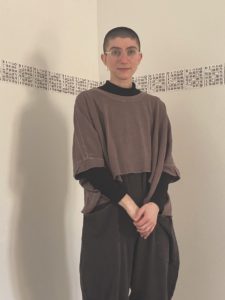
West often works in installation and film simultaneously, allowing echoes of one project to reverberate against the other. “Usually the installation comes first, then I drift off into film,” West says. While in Provincetown, they are editing their first feature-length film, Playland. Set in the Playland Café, formerly the oldest gay bar in Boston, the film “has a lot to do with ghosts — the unseen and liminal spaces,” says West.
West’s films tell a story through “mood-building and mood-shifting” instead of following a traditional narrative. “The idea I have been thinking about a lot is Martin Heidegger’s concept of ‘Stimmung,’ the word for mood in German, which describes a fundamental way of being, and this always includes being with one another,” says West.
West was born the oldest of seven children to a military family that moved from Hawaii to California to Virginia and finally to Monument, a small, conservative Colorado town. “Other than having my siblings around me as built-in friends, my adolescence was pretty lonely and isolating,” says West. “It wasn’t until later on that I was able to fully formulate and articulate who I wanted to be and who I wanted to surround myself with.”
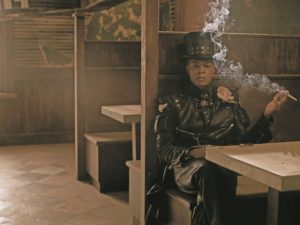
When shooting a film, West strives to work with an entirely queer cast and crew. The experience is as much about creating a queer collective as it is about collectively creating queer art.
West planned on studying history in college but was hooked after taking one film class. Still, West says, “history and the ways in which lost or overlooked queer histories permeate our present is a big part of my work.” While researching Playland, West immersed themself in the History Project, an independent LGBTQ archive in Back Bay.
“There used to be a notorious red-light district in downtown Boston called the ‘Combat Zone,’ ” West explains, referring to the adult entertainment area around Washington Street that was established in the 1960s. The area became the site of the city’s gay and drag bars, including the Playland Café. By the 1990s, with the steep rise in property values and the spread of AIDS, the Boston Redevelopment Authority began to dismantle this “district of immoral pursuits,” selling it off to private owners.
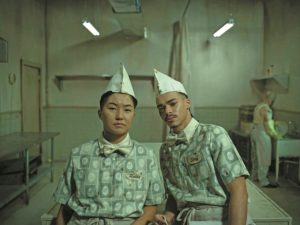
In 1998, the Playland Café lost its license and was shut down. Later, the building was demolished. By 2000, virtually all formerly gay gathering spaces had made way for Starbucks and other franchises.
“Queer bodies have historically existed only in hidden or imagined spaces,” says West. “With the burlesque theaters and gay bars in the ‘Combat Zone’ gone, an entire free and vibrant gay subculture was erased.”
West’s film focuses on the people who worked at the Playland Café — the bartenders, servers, drag queens, and performers who lost both their livelihood and way of life. “Playland has a lot to do with these ghosts, and what it means to resurrect and bring back to life people and places that have been lost,” West says. “It feels like a terrifying responsibility to document this loss, but one that I am happy to take on.”
Ghost in the Machine
The event: A pop-up installation by Georden West
The time: By appointment; Saturday, March 5 through Tuesday, March 8
The place: Hudson D. Walker Gallery, Fine Arts Work Center, 24 Pearl St., Provincetown
The cost: Free



